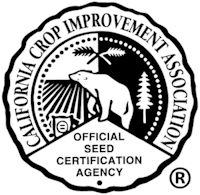(Trifolium variegatum)
GENERAL STANDARDS -- The standards on this sheet are in part condensed and apply to Variegated Clover. For greater detail and additional provisions, see the Native Seed Program Standards.
APPLICATION -- Applications should be submitted electronically on CCIA’s website (Application to grow and certify seed) as soon as possible and no later than three (3) weeks after planting. New applicants should contact the CCIA office for instructions on obtaining access to the online application system.
FIELD HISTORY -- Land must not have grown or been seeded to any Trifolium species during previous five years to be eligible to produce G1 or G2 seed. Land must not have grown or been seeded to these Trifolium species during the previous two years to produce G3-G10 seed unless the previous crop was of the same released material and of a class equal or higher to that of the crop seed. Variegated Clover must be planted in distinct rows. Exceptions must be approved by the Seed Certification Office prior to planting.
ISOLATION -- Fields or portions of fields producing seed must be isolated the following distances:
| Factor | G1 | G2 | G3 to G10 |
| Isolation requirement (any size field) | 60 feet | 30 feet | 15 feet |
FIELD INSPECTION -- Include a seedling and a seed crop inspection.
Off-Types -- Every field should be rogued to remove any plants of another crop or variety, including volunteers. Native seed selections cannot always be differentiated at field inspection. When differences can be distinguished, the maximum mixture of other varieties or definite off-types permitted is as follows:
| G1 | G2 | G3 to G10 | |
| 1:1,000 | 1:500 | 1:250 | |
Weeds -- Fields must be free of any prohibited noxious weeds. Restricted noxious weeds and common weeds difficult to separate must be controlled. Prohibited and Restricted noxious weeds are listed in the California Seed Law/CA Code of Regulations/Sections 3854 and 3855. See California Seed Law - Prohibited and Restricted Noxious Weed List.
Fields may be refused certification due to unsatisfactory appearance caused by weeds, poor growth, poor stand, disease, insect damage, and any other condition which prevents accurate inspection or creates doubt as to identity of the variety.
SEED STANDARDS – Minimum Sample Size – 2 oz.
| Factor | G1 | G2 | G3 to G10 |
| Pure Seed (Minimum) | 80.00% | 80.00% | 80.00% |
| Inert Matter (Maximum) | 20.00% | 20.00% | 20.00% |
| Total Other Crop Seed (Maximum) | .20% | .30% | .50% |
| Weed Seed (Maximum) | .20% | .30% | .50% |
| Noxious Weed | None | None | None |
| Germination and Hard Seed (Minimum) | 65.00% | 65.00% | 65.00% |
Updated: May 2024
